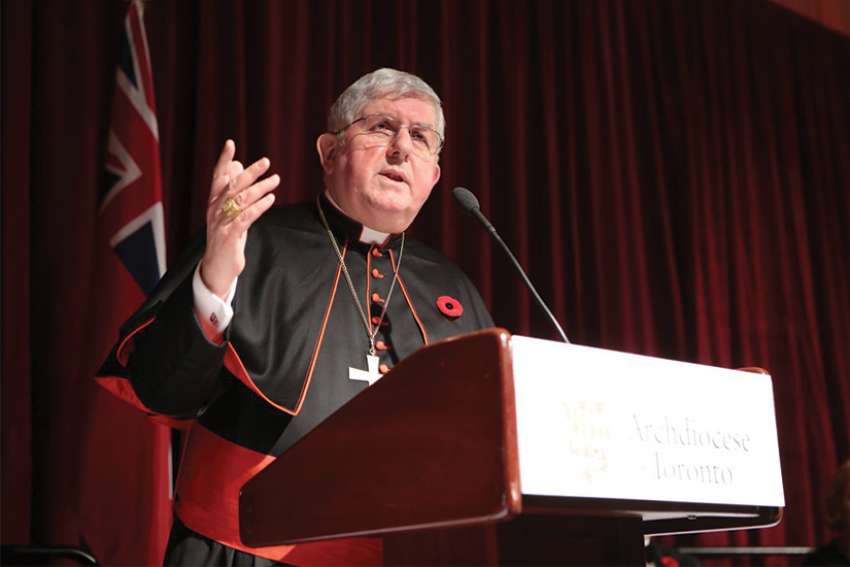Speaking to more than 1,600 guests at the 39th annual Cardinal’s Dinner in Toronto on Nov. 8, the cardinal urged them to resist any attempt to expand the federal euthanasia law to include minors.
“The time for review of the federal euthanasia law is upon us, and there is great pressure to eliminate the so-called ‘safeguards’ which made it seem to be not so terrible,” he told the audience at the Metro Toronto Convention Centre.
“One such safeguard is that euthanasia is to be only for adults. Now we hear arguments made that the concept of ‘adult’ is to be made so elastic that even minors are to be eligible for euthanasia, even without the consent of their parents. The cold shadow of euthanasia is spreading further in our land, and we must resist that.”
A government committee is expected to deliver a report next month that examines extending assisted suicide to youth under 18, psychiatric patients and consenting adults who give an advance directive to be euthanized in the event they become incapacitated by illness or disease.
The cardinal stressed the need for access to palliative care. “That, not euthanasia, is the way forward,” he said.
“When people are lonely and feel that they are useless, and that life is not worth living, we must reach out, in practical love and support. Each person is worthy of life and of our love.”
Chaired by Tom Woods, chair of the Integrated Health Network of Providence, St. Joseph’s and St. Michael’s Healthcare, the dinner featured head table guests from several layers of government, as well Apostolic Nuncio Archbishop Luigi Bonazzi.
The guests included federal Minister of Finance Bill Morneau, federal Conservative leader Andrew Scheer, Ontario premier Doug Ford and Toronto mayor John Tory, as well as Mississauga mayor Bonnie Crombie and Maurizio Bevilacqua, mayor of Vaughan.
The central theme of Collins’ speech was on the importance of Catholic heath care, although he also acknowledged several issues that have been in the news, including the “terrible evil” of the attack on the Pittsburgh synagogue, the plight of Christians suffering religious persecution in the Middle East, and the Church’s sex abuse scandal.
“We must always be vigilant and continue zealously to eliminate corruption from the Church,” he said in reference to the abuse. “Above all we must remember that the pain of what was suffered in the past continues into the present for those who endured this great evil. We must never cease to do whatever we can to help all victims of abuse.”
In his speech, Collins called Catholic health care a “bright light of hope in this valley of tears.”
Acknowledging a history of healing that goes back to Mother Delphine Fontbonne and continued with the Sisters of St. Joseph, Collins said the the institutions of Catholic health care are “united in a common mission rooted in the Gospel.”
“In any worthwhile enterprise, we must be clear about our identity: about who we are,” he said. “That is true as well of Catholic health care. Some here present are directly engaged in this great work, but all of us benefit from it, and all of us need to consider what makes it what it is.”
Collins described Catholic health care as being “especially dedicated to caring for those who are marginalized — ‘the least of my brethern.’”
Collins said two themes essential to Catholic health care are reverence for the human person and the “sacrificial love of strangers.”
“Reverence for the dignity of the human person determines the way we treat the beginning, the middle, and the end of life,” he said.
“We all come to the end of this journey of earthly life,” he said. “We are destined to die. But we must never take a human life – another’s or our own – for it is not ours to take: we are stewards, not owners, of the life entrusted to us by God. With the tragic introduction into our country of euthanasia, we must insist that we do not do that. Bringing about the death of a patient is just plain wrong.”
Collins went on to said that the foundation of Catholic health care is built on the love known as “agape,” or “the practical sacrificial love of strangers.”
“First, it is sacrificial – as in laying down one’s life for one’s friends,” he said. “When we sacrifice we let go of the ego, and forget ourselves in order to serve another.
“Secondly, the love that is the motivation for Catholic health care in the imitation of Christ the Healer is practical: not a matter of pretty words, but of practical action. The model here is Jesus at the last supper: he gets down on his knees and washes the feet of his disciples, and invites them to do likewise. Our love must be down to earth and practical.”


